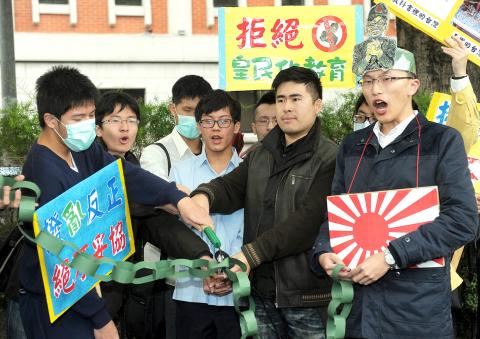A group of high-school students and young China-centered history advocates yesterday said they supported the changes the Ministry of Education (MOE) has proposed for the high-school history curriculum and urged it to stand firm against opposing views.
Following a wave of protests against the adjustments by history professors and students, political figures and high-school teachers over the past two weeks, a dozen young people, referring to themselves as the Anti-Independence-Oriented-History Front, yesterday defended the ministry.
Comprised of the Alliance of Students Safeguarding the Nation’s History, the New Youth Justice Alliance and the Association of New Chinese Children, the Front members raised banners that read: “No compromise to bringing order to chaos” and “Say No to Kominka education” in front of the ministry building in Taipei.

Photo: CNA
The Kominka movement refers to the Japanese endeavor during the Japanese colonial period to make Taiwanese loyal subjects of the emperor.
People at the rally said that the ministry’s adjustments were only to “justifiably have history written more in line with the Republic of China (ROC) Constitution” and said that they are people of ROC, not Japan’s imperial subjects.
Hou Han-ting (侯漢廷), a graduate political science student at National Taiwan University and the head of the school’s China Rise Club, said the textbook was “the execution of the will of the state” and so should teach history from the ROC’s point of view rather than from a Taiwanese independence viewpoint.
“The adjustments are only small changes to bring order to the chaos [incurred by the Democratic Progressive Party administration during its eight years in power],” Hou said.
“What’s wrong with telling the truth about Taiwanese history of Japanese persecuting Taiwanese and forcing some to become comfort women?” Hou added.
Chinese Culture University history graduate student Lin Ming-cheng (林明正) criticized the current textbook for introducing Taiwanese temples that enshrine Japanese police from the Japanese colonial period.
Lin showed pictures of Tainan City’s temples enshrining Koxinga (國姓爺) for “the re-conquest of Taiwan” and academic and bureaucrat Lin Zexu’s (林則徐) action against opium in 1838, pointing out that these cases indicated “the real Taiwanese society has a China-centered view of history.”
New Chinese Children Association head Wang Puchen (王炳忠) said critics who accused the MOE of acting to “de-Taiwanize” the nation had “blemished” the government’s effort, adding that the changes are not to devalue Taiwan, but to get rid of Kominka thinking.
“Real Taiwanese history can be seen as the history of modern China being encroached by colonial empires,” Wang said, adding that localization is not equal to Taiwanese independence.
Hou, Lin and Wang were the leaders of the movements supporting pro-China Want Want China Times Group in last year's media monopolization controversy.

Taiwan is stepping up plans to create self-sufficient supply chains for combat drones and increase foreign orders from the US to counter China’s numerical superiority, a defense official said on Saturday. Commenting on condition of anonymity, the official said the nation’s armed forces are in agreement with US Admiral Samuel Paparo’s assessment that Taiwan’s military must be prepared to turn the nation’s waters into a “hellscape” for the Chinese People’s Liberation Army (PLA). Paparo, the commander of the US Indo-Pacific Command, reiterated the concept during a Congressional hearing in Washington on Wednesday. He first coined the term in a security conference last

Prosecutors today declined to say who was questioned regarding alleged forgery on petitions to recall Democratic Progressive Party (DPP) legislators, after Chinese-language media earlier reported that members of the Chinese Nationalist Party (KMT) Youth League were brought in for questioning. The Ministry of Justice Investigation Bureau confirmed that two people had been questioned, but did not disclose any further information about the ongoing investigation. KMT Youth League members Lee Hsiao-liang (李孝亮) and Liu Szu-yin (劉思吟) — who are leading the effort to recall DPP caucus chief executive Rosalia Wu (吳思瑤) and Legislator Wu Pei-yi (吳沛憶) — both posted on Facebook saying: “I

The Ministry of Economic Affairs has fined Taobao NT$1.2 million (US$36,912) for advertisements that exceed its approved business scope, requiring the Chinese e-commerce platform to make corrections in the first half of this year or its license may be revoked. Lawmakers have called for stricter enforcement of Chinese e-commerce platforms and measures to prevent China from laundering its goods through Taiwan in response to US President Donald Trump’s heavy tariffs on China. The Legislative Yuan’s Finance Committee met today to discuss policies to prevent China from dumping goods in Taiwan, inviting government agencies to report. Democratic Progressive Party Legislator Kuo Kuo-wen (郭國文) said

The Ministry of Economic Affairs has fined Taobao NT$1.2 million (US$36,900) for advertisements that exceeded its approved business scope and ordered the Chinese e-commerce platform to make corrections in the first half of this year or its license would be revoked. Lawmakers have called for stricter supervision of Chinese e-commerce platforms and more stringent measures to prevent China from laundering its goods through Taiwan as US President Donald Trump’s administration cracks down on origin laundering. The legislature’s Finance Committee yesterday met to discuss policies to prevent China from dumping goods in Taiwan, inviting government agencies to report on the matter. Democratic Progressive Party